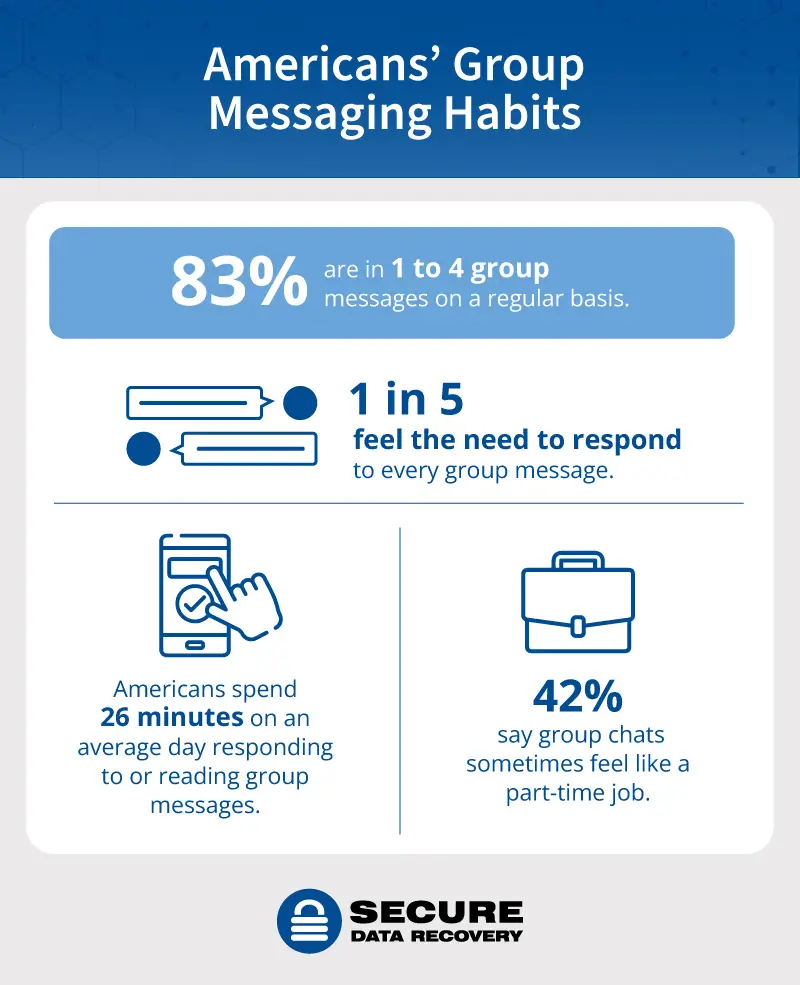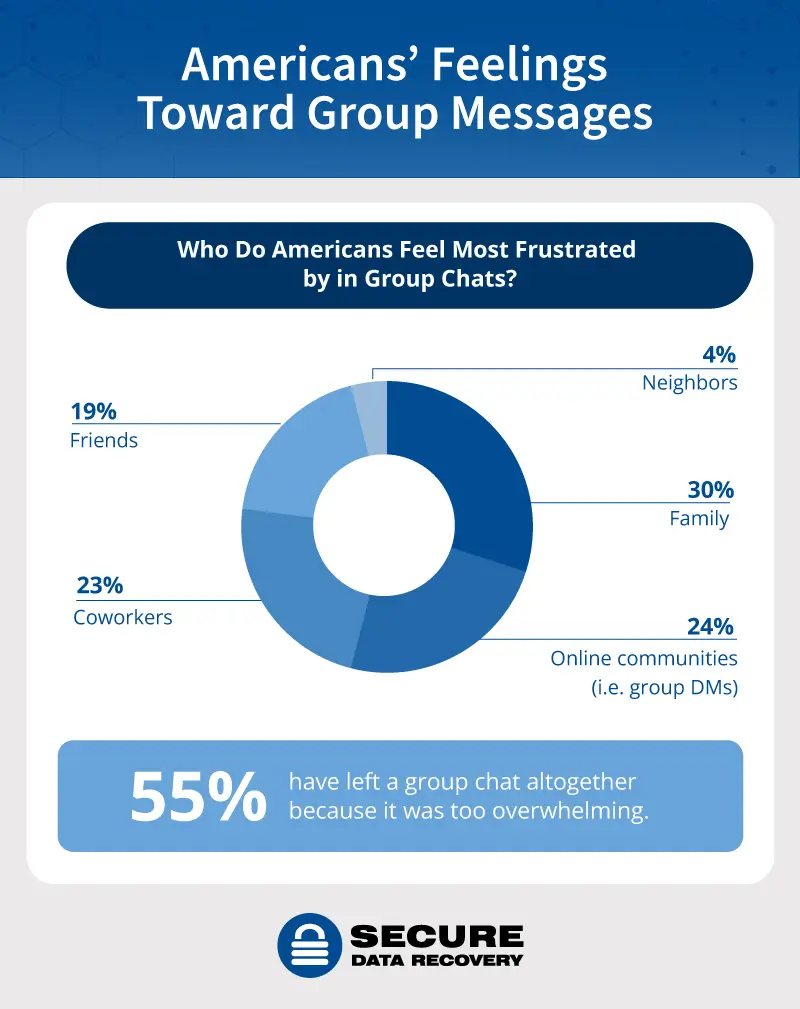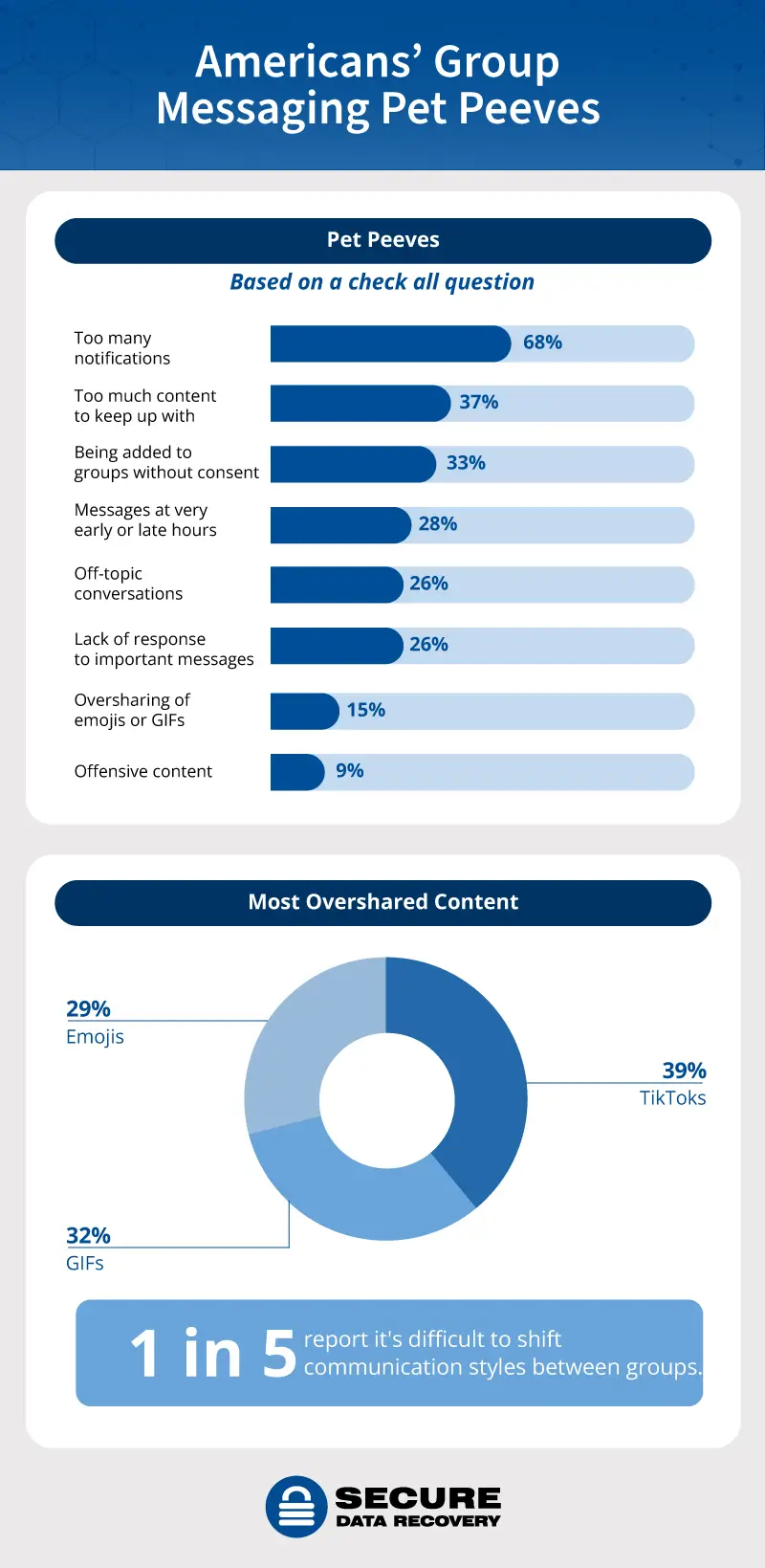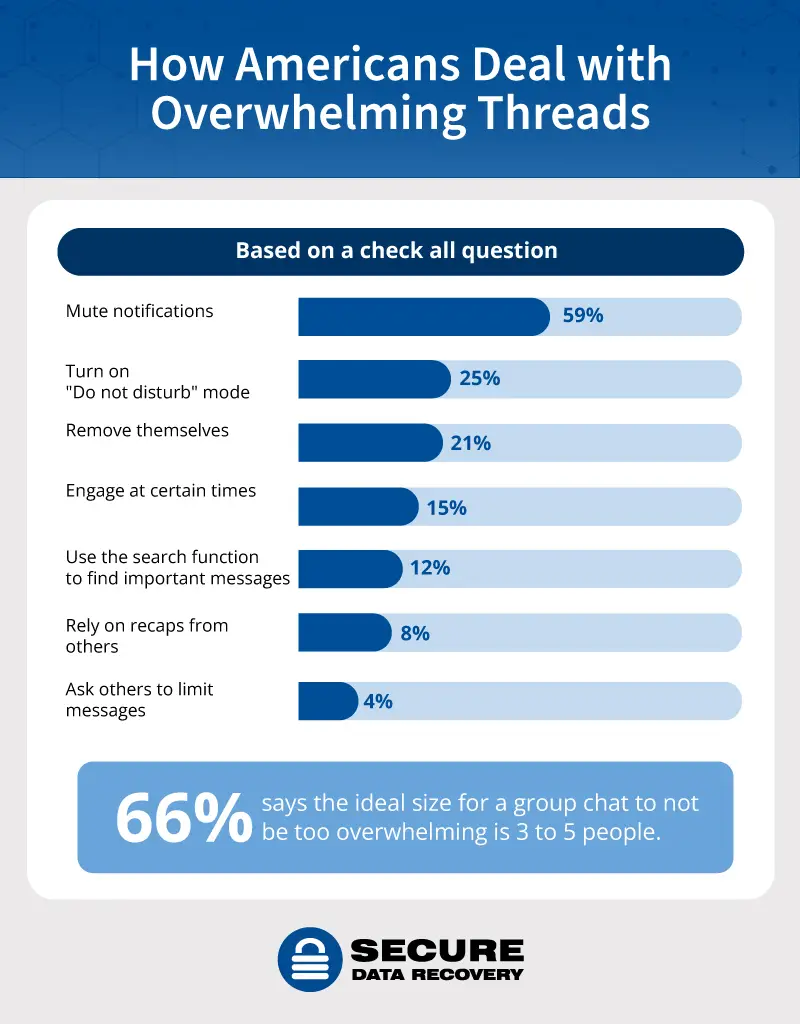In today’s hyper-connected digital landscape, staying engaged is no longer a choice but a necessity. Yet, amid the numerous platforms of communication buzzing with notifications, one arena often takes precedence: group message threads.
Whether it’s family discussions or casual banter among friends, group chats have woven their way into our daily routines. But you have to admit — sometimes we get annoyed when certain things are overshared in a group chat. It can feel as though our lives have been hijacked by an endless stream of memes, announcements, and debates. Suddenly, navigating through group messages begins to feel like a demanding part time job.
So we were curious: Are we all silently battling the tyranny of the group chat? Do the unwritten rules of immediate responsiveness contribute to stress? To what extent are people muting threads to regain their peace?
To answer these questions and more, we surveyed Americans about their experiences and attitudes toward group messaging. So sit back, mute your notifications, and read on to explore this intriguing facet of our digital lives.
Key Findings
- The majority (52%) say it’s difficult to keep up with group chat messages.
- A significant 66% have felt overwhelmed by group chats.
- Half of Americans (49%) are annoyed by very early or very late messages.
- A large majority (75%) have muted an annoying group message thread.
- TikToks are the most overshared type of media in group chats.
Americans’ group messaging habits
Almost universally, Americans are involved in group messaging, with an astounding 99.5% having participated in at least one group message thread. Group messaging is especially prominent among the younger generation, as our data shows that 100% of Gen Z has participated in a group message. This trend also extends into day-to-day communications, with 83% of Americans regularly involved in one to four group chats.
The level of engagement also proves significant. The average American dedicates about 26 minutes per day to reading and responding to their group messages. While this may seem manageable as an isolated figure, the impact becomes more pronounced when considering that this time is typically dispersed across the entire day, often interrupting other activities. This can lead to a sense of continuous engagement, to the extent that 42% of respondents report feeling as if managing their group chats is akin to working a part-time job.
Nevertheless, group messaging tends to center around personal relationships. A significant 75% of these digital conversations involve friends, while 67% include family members. But despite their ability to keep us connected, the high volume of group messages can pose challenges.
Over half of respondents (52%) admit to struggling to keep up with the sheer number of messages they receive. Further, one in five Americans feel compelled to respond to every group message, thereby increasing their level of engagement and time commitment.

Majority feels overwhelmed by group messages
Group messaging, while a widespread mode of communication, has its downsides with a significant 66% of Americans admitting to feeling overwhelmed by group chats. This sense of being overwhelmed is more pronounced among women, with 72% reporting such feelings, compared to a slightly lower 58% of men.
The overwhelmingness can escalate to the point where a majority of individuals, approximately 55%, have taken the step to exit a group chat altogether due to its excessive nature.
It also appears that group messages can often become a source of irritation, with a notable portion of these frustrations arising from family chats (30%) and online community discussions (24%) like Reddit threads or social media DMs.
Additionally, a sense of exclusion can accompany these frustrations, with 30% of respondents confessing to feeling left out of group message conversations, particularly when topics they can’t contribute to are discussed. This could be due to a large majority (72%) reporting having been in a group chat where they did not know every person, adding yet another layer of complexity and stress to group communications.
Despite the regular irritation caused by the incessant notifications from group messages, 34% of Americans admit to feeling trapped in this cycle of digital communication. However, rather than opting to mute the notifications, these individuals accept their frustration due to either being too busy or just not feeling motivated enough to modify the settings.

Americans reveal their group messaging pet peeves
Adding to the downsides, group messaging also brings a unique set of irritations. Nearly half of respondents (45%) believe that their group chat companions overuse certain forms of media, like emojis and GIFs. Interestingly, this annoyance varies across generations. For instance, Baby Boomers don’t seem particularly annoyed by TikToks videos, with only 25% reporting annoyance, but this figure nearly doubles to 46% when it comes to the overuse of emojis.
Another common nuisance is the timing of messages, with nearly half (49%) expressing annoyance at receiving very early or very late messages. This issue can be exacerbated by the inherent need to adapt or code-switch their voice between different groups, which one in five find challenging. Even so, a majority (76%), acknowledge that each of the groups they participate in has a unique tone and style of communication.
Missteps are not uncommon in the world of group chats, as indicated by 40% of respondents who have accidentally replied to the wrong group message. Moreover, an overlapping aspect of group messaging emerges with 41% admitting to sharing the same content across multiple groups, leading to similar conversation threads.

How Americans deal with overwhelming group messages
With this constant digital communication, individuals are increasingly resorting to certain measures to manage the overwhelmingness. Three-quarters (75%) choose to mute the groups, indicating a preference for handling irritating group messages passively rather than directly addressing the issue. This action suggests that most people opt for quieting the noise rather than disrupting the group dynamics.
However, some respondents adopt a more assertive approach, with 21% deciding to remove themselves entirely from the group chats that they deem burdensome or irrelevant to their interests. This choice demonstrates a willingness to prioritize personal comfort over group participation, further illustrating the complexities of this type of digital interaction.
When it comes to the ideal size of a group chat, the majority of Americans (66%) agree that a group of three to five people is manageable and less likely to be overwhelming. This preference indicates an appreciation for more intimate group chats where the conversation is easier to follow and each individual’s contribution is more significant.

Group messages are an inevitable part of our digitally interwoven lives. As we’ve discovered, they can be sources of stress and annoyance, and, quite often, important information. But amidst this digital noise, it’s essential to remember the importance of maintaining a balanced relationship with our devices. Muting notifications and setting boundaries can go a long way in managing group message fatigue.
Most importantly, safeguarding your personal data should be a top priority. The information we share in these threads can sometimes be sensitive, and ensuring its security is paramount. Secure Data Recovery can safeguard information from potential threats and recover data when it’s lost.
As you navigate group messages, you can ensure that you secure your data and respect your sanity. So the next time your device pings with a barrage of group messages, remember — you have the power to control what and when you share.
Methodology
We surveyed 1,005 people across the United States on the Prolific online research platform, asking about their habits and experiences with group messaging threads. Of our respondents, 48% identified as female, 50% as male, and 2% nonbinary. Respondents’ ages ranged from 18 to 76 years old; 16% Gen Z, 51% millennials, 21% Gen X, and 12% baby boomers.







